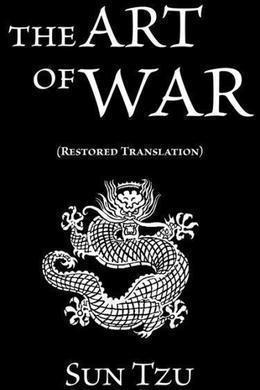
-
EPUB 215 KB
-
Kindle 271 KB
-
Support epubBooks by making a small $2.99 PayPal donation purchase.
Description
The Art of War is an ancient Chinese military treatise attributed to Sun Tzu, a high-ranking military general, strategist and tactician. The text is composed of 13 chapters, each of which is devoted to one aspect of warfare. It is commonly known to be the definitive work on military strategy and tactics of its time. It has been the most famous and influential of China’s Seven Military Classics, and “for the last two thousand years it remained the most important military treatise in Asia, where even the common people knew it by name.” It has had an influence on Eastern and Western military thinking, business tactics, legal strategy and beyond. (source: Wikipedia)
212 pages with a reading time of ~3.25 hours (53188 words), and first published in 1910. This DRM-Free edition published by epubBooks, 2014.
Community Reviews
There are currently no other reviews for this book.
Excerpt
Ts’ao Kung, in defining the meaning of the Chinese for the title of this chapter, says it refers to the deliberations in the temple selected by the general for his temporary use, or as we should say, in his tent. 1. Sun Tzu said: The art of war is of vital importance to the State. 2. It is a matter of life and death, a road either to safety or to ruin. Hence it is a subject of inquiry which can on no account be neglected. 3. The art of war, then, is governed by five constant factors, to be taken into account in one’s deliberations, when seeking to determine the conditions obtaining in the field. 4. These are: (1) The Moral Law; (2) Heaven; (3) Earth; (4) The Commander; (5) Method and discipline. [It appears from what follows that Sun Tzu means by “Moral Law” a principle of harmony, not unlike the Tao of Lao Tzu in its moral aspect. One might be tempted to render it by “morale,” were it not considered as an attribute of the ruler in ss. 13.] 5. The MORAL LAW causes the people to be in complete accord with their ruler, so that they will follow him regardless of their lives, undismayed by any danger. [Tu Yu quotes Wang Tzu as saying: “Without constant practice, the officers will be nervous and undecided when mustering for battle; without constant practice, the general will be wavering and irresolute when the crisis is at hand.”] 7. HEAVEN signifies night and day, cold and heat, times and seasons. [The commentators, I think, make an unnecessary mystery of two words here. Meng Shih refers to “the hard and the soft, waxing and waning” of Heaven. Wang Hsi, however, may be right in saying that what is meant is “the general economy of Heaven,” including the five elements, the four seasons, wind and clouds, and other phenomena.] 8. EARTH comprises distances, great and small; danger and security; open ground and narrow passes; the chances of life and death. 9. The COMMANDER stands for the virtues of wisdom, sincerity, benevolence, courage and strictness. [The five cardinal virtues of the Chinese are (1) humanity or benevolence; (2) uprightness of mind; (3) self-respect, self- control, or “proper feeling;” (4) wisdom; (5) sincerity or good faith. Here “wisdom” and “sincerity” are put before “humanity or benevolence,” and the two military virtues of “courage” and “strictness” substituted for “uprightness of mind” and “self- respect, self-control, or ‘proper feeling.’”] 10. By METHOD AND DISCIPLINE are to be understood the marshaling of the army in its proper subdivisions, the graduations of rank among the officers, the maintenance of roads by which supplies may reach the army, and the control of military expenditure. 11. These five heads should be familiar to every general: he who knows them will be victorious; he who knows them not will fail. 12. Therefore, in your deliberations, when seeking to determine the military conditions, let them be made the basis of a comparison, in this wise: – 13. * Which of the two sovereigns is imbued with the Moral law? [i.e., “is in harmony with his subjects.” Cf. ss. 5.] * Which of the two generals has most ability? * With whom lie the advantages derived from Heaven and Earth? [See ss. 7,8] * On which side is discipline most rigorously enforced? [Tu Mu alludes to the remarkable story of Ts’ao Ts’ao (A.D. 155-220), who was such a strict disciplinarian that once, in accordance with his own severe regulations against injury to standing crops, he condemned himself to death for having allowed his horse to shy into a field of corn! However, in lieu of losing his head, he was persuaded to satisfy his sense of justice by cutting off his hair. Ts’ao Ts’ao’s own comment on the present passage is characteristically curt: “when you lay down a law, see that it is not disobeyed; if it is disobeyed the offender must be put to death.”] * Which army is stronger? [Morally as well as physically. As Mei Yao-ch’en puts it, freely rendered, “ESPIRIT DE CORPS and ‘big battalions.’”] * On which side are officers and men more highly trained? [Tu Yu quotes Wang Tzu as saying: “Without constant practice, the officers will be nervous and undecided when mustering for battle; without constant practice, the general will be wavering and irresolute when the crisis is at hand.”] * In which army is there the greater constancy both in reward and punishment? [On which side is there the most absolute certainty that merit will be properly rewarded and misdeeds summarily punished?] 14. By means of these seven considerations I can forecast victory or defeat.
